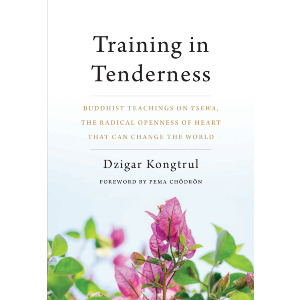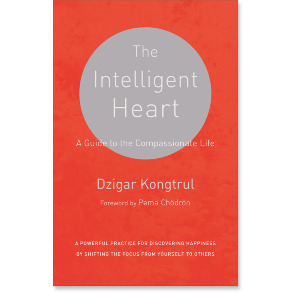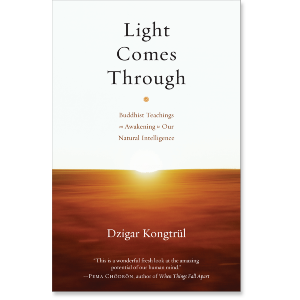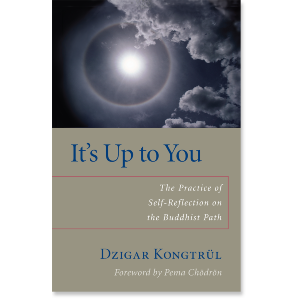When we carefully and diligently water our seed of tsewa, applying all the wisdom and skillful means we can gather, that seed will eventually grow into a magnificent tree bearing abundant fruit. This is the third metaphor in Chandrakirti’s homage to the tender heart. The fruit manifests as an ever-increasing desire and ability to benefit others.
We can benefit beings in many ways—physically, emotionally, mentally—and we should always take advantage of any opportunity we have to help others. But the greatest benefit of all, the one we should set our sights on, is to help others awaken completely to the inexhaustible tenderness of their own hearts. When we can help people achieve their full potential of tsewa—when their tsewa reaches the stage where it flows with the power and grace of Niagara Falls—we have benefited them in the profoundest way possible.
To achieve our full potential to benefit others in this way, we first have to do whatever it takes to open our own heart, further and further. As my mother used to say, “You have to make your heart so big you could hold a horse race inside of it.” When your heart is as big as it could possibly be, big enough to hold deep love for every sentient being in the universe, then you have reached the full blossoming of your enlightened nature. Because you have shed every remnant of self-clinging, your mind is completely and forever free of delusion. There is nothing to obscure your understanding of how beings suffer and how their minds can be transformed. Like the Buddha, you have reached a state where you can be the perfect guide for others.
The greatest benefit of all, the one we should set our sights on, is to help others awaken completely to the inexhaustible tenderness of their own hearts.
Becoming a Guide
This doesn’t mean that you will be able to bring others to enlightenment without their own effort being involved and regardless of all other conditions. As it is said, even the buddhas can’t transport sentient beings to higher states of happiness as if tossing up a pebble. Everyone has their own impediments and their own karma. Even the most perfect guide can’t intervene in someone else’s karma and rearrange their life for them. If that were possible, it would already have happened for all of us, because the buddhas and bodhisattvas have no greater wish than to bring all beings to enlightenment.
Reflecting on this will give us a more realistic idea about what we can do to benefit others. If fully enlightened beings are limited in this way, how much more limited are we at this stage? We have to come to terms with the fact that we can’t immediately help others to the degree and in the way we would like. On the other hand, there is a lot we can do, even when our tsewa is still impeded and our heart is not nearly as open as it will be one day.
Just in itself, expanding our own tender heart brings benefit to others. By cultivating impartial, free-flowing warmth, we automatically orient ourselves to be in favor of anything that enhances the well-being of others and against anything that causes them suffering. The heart of tsewa naturally and continually expresses wishes on others’ behalf. We can’t see, in any obvious way, how and when these wishes actually benefit other beings, especially those who are far away. Nonetheless, our wishes do support them, especially when we wish for them to experience tsewa in their own lives, to be able to express their own warm heart and to receive that tenderness from others.
When we think about beings who are undergoing great suffering, it is natural to feel helpless. For example, what can we do for a refugee family that has just crossed the Mediterranean on an overcrowded rubber boat and is now facing a precarious future? We could wish for these people, who have lost everything and gone through such a dangerous ordeal, to meet kind people, to find a nice home, and so on. These are certainly good wishes to make, but whether they come true will also be based on many other factors that will take a long time to play out. On the other hand, we can simply open our heart to them and wish for them to have an abundance of love and warmth in their lives and in their minds. We can further wish that this love gives them the resilience to overcome their challenges—the strength, ability, and resourcefulness to do what is necessary to live well.
Just in itself, expanding our own tender heart brings benefit to others.
Offering Merit
I believe that this kind of wish has an immediate effect. It is similar to when you tell someone, “I’m thinking about you.” When you’re going through a difficult time, knowing that someone is thinking about you touches you and gives you strength. It makes you feel supported. Of course, in the case of the refugees, they’re not aware of our well-wishes. Even so, when we express love to people who are beyond the reach of our communication, there is some transmission of the energy of our tsewa. They do receive it, and it does make a difference. When we send tsewa to any beings in this world, near or far, human or nonhuman, our warm, purely positive energy touches them. It gives them more resilience to make it through whatever they have to endure and to overcome their karma sooner rather than later. When we make such a connection to other beings, they are no longer alone, no longer lost somewhere in the abyss of samsara, untouched by love.
We have the ability to send others positive energy because we have accumulated a store of positive karma in our mindstream. Whenever we do anything on behalf of others, we sow a seed of positive karma that remains latent in our consciousness until the right conditions appear for it to ripen. First, the effect appears in our mind, and then it shows up in our external world. For example, when we act generously, we develop an internal feeling of wealth that is then reflected in our external world as increased abundance. In Buddhist terminology, this positive karma is known as “merit.” We accumulate merit whenever our physical deeds, our speech, or our thoughts are oriented to the welfare of others. In other words, we accumulate merit when our body, speech, and mind are in sync with tsewa.
If we use the merit we have accumulated to satisfy the self that we cling to out of delusion, our store will rapidly diminish, and our heart will become tighter and tighter. This is because focusing on the singular, isolated self is the antithesis of tsewa. The positive actions we have done in the past will continue to bear their fruit, but if we don’t continue to keep our heart open to others, we will only accumulate negativity. Our precious merit will be wasted on pleasant experiences that are fleeting and ultimately meaningless.
Therefore, the best thing we can do with our merit is to offer it freely for the benefit of others. Whenever you do anything meritorious, no matter how small, you can make a conscious wish that the positive energy from your action will have a vast effect, like an acorn growing into a giant oak tree. This is not a farfetched idea when we contemplate the interconnected nature of all things. Everything we do or even think has endless, rippling repercussions. For this reason, we don’t have to feel helpless about benefiting others. We always have something to give.
By sending your merit to others, you are not losing anything yourself. On the contrary, the more merit you offer to others, the more your heart opens; the more your heart opens, the more positive your actions become; the more positive your actions become, the more merit you accumulate and are able to offer. If we know how to work with merit, it becomes an infinitely self-replenishing fuel that will eventually take us and others all the way to enlightenment.
When we dedicate our merit to others, however, we need to believe that it actually reaches them. This requires faith because we can’t literally see the results of our wishes. We don’t know how or when the effects take place. It is said that only the buddhas can see the vast workings of cause and effect. We who have a more limited view of karma can only trust that our merit is helping others, without knowing all the specifics.
Having such trust is a much more positive attitude than thinking we can’t be making a difference for others unless we can see how cause and effect are operating on a physical level. That is an extremely limited vision of what we can do. Closing down to that kind of limitation is also philosophically narrow-minded, for how is it essentially different from thinking that nothing in the world exists beyond what we can see with our own eyes?
If we know how to work with merit, it becomes an infinitely self-replenishing fuel that will eventually take us and others all the way to enlightenment.
The Power of Thought
We are often skeptical about the power of thought. This is strange because we are always struggling with our own thoughts. Most of us are more scared of our own mind than of anything else. We’re scared of our anger, our reactions, our confusion. To be scared of them, we have to believe that they are powerful. Yet at the same time, we can be so skeptical about the power of our good wishes and compassionate thoughts on behalf of others. Even if miracles happen as a result of our prayers, we can keep insisting on our skepticism, finding other explanations. This is how we tend to undermine our strength and get caught up in low self-esteem.
Your body is limited in where it can go and be. You may spend all day within the walls of your workplace and all night within the walls of your house. And within those walls, there are few other sentient beings. But your mind and heart have no boundaries. Our connections with others are not limited by walls. Nor are our responsibilities limited to those we see in our daily lives. It is true that we may have more immediate responsibilities to our families and those who directly depend on us, but if our bigger vision is bodhichitta, the wish to attain enlightenment for the benefit of all beings, then our responsibility is to all beings. While taking care of those who are close to us, we need to open our heart further to those outside of this small circle. In this life, we have a close karmic connection to some beings, while the overwhelming majority we never see or have any contact with. But if we keep in mind that all beings are identical in wanting to be happy and free from suffering, we can diminish our habitual distinction between near and far. In this way, we can keep strengthening and expanding our feeling of being connected to everyone suffering in samsara, until our longing to benefit others becomes so powerful that it overshadows all our self-centered or narrow-minded wishes.
As your heart opens and your actions become more and more oriented to the benefit of others, you will accumulate tremendous merit that you can harness for the purpose of benefiting individuals, groups of beings, and eventually all sentient beings. You should also dedicate your merit for your own enlightenment, so that you may swiftly become the perfect guide to help others realize their innate, selfless, tender heart. By directing your positive karma in these ways, you will automatically create connections and situations in which you will be able to benefit others in the future—if not in this life, then in future lives. You will lay the groundwork for being able to bring all beings, one by one, to the full realization of their enlightened nature. This is the magnificent fruit of tsewa.
Related Books
$14.95 - Paperback
$21.95 - Paperback
$19.95 - Paperback
$19.95 - Paperback







